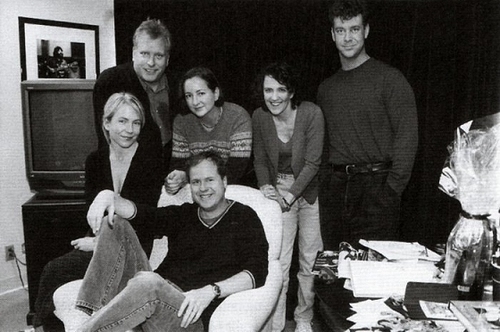As with any favorite, the TV series we love, those we come back to time and again, tend to say a lot about us. They remind us of who and where we were when we first saw them and help us chart how we’ve grown and changed over the years. They become guides, informing our view of the world or just helping us navigate it, be it through much-needed escapism, prompted introspection, or emotional catharsis. Welcoming a show week after week into our homes, sharing years with a group of imaginary friends, it’s little surprise we form such strong attachments, be it to a character, an actor, or a series.
I suppose, looking back, I was predisposed to love Buffy the Vampire Slayer. I was raised on a steady diet of The Hobbit, Little Women, and The Princess Bride; Christmas at my grandparents’ meant watching Star Wars and long car rides were perfect opportunities for DnD. An at times campy, at times deadly serious fantasy series full of entertaining, funny, imaginative characters would probably have always hit me in the sweet spot. But while I continue to search out great television, and while my list of favorites keeps growing, there’s something special about Buffy that separates it from the rest.
I don’t actually remember when I started watching the show. I remember waiting with baited breath for “Once More with Feeling”, the musical episode, I remember season 4 as appointment viewing, and I remember the Christmas present from my brothers of the season 1 box set that started my DVD library and penchant for commentary tracks. But I don’t remember when I first dove in with the series that has become one of my absolute favorites, and perhaps that’s helped cement its place- it’s pretty much always been there.
Buffy is the first series I remember sharing with my family and friends. I watched it live, of course, but I’ve also rewatched the series many times with various friends just discovering it. It was common ground for my sister and me as we transitioned from bitter enemies (as so many siblings start out) to close friends. By the time I left for college, we could converse almost entirely in references or lace inside jokes into random conversations through simple word choice (and we both made sure to never sign yearbooks “Have a nice summer!”). In undergrad, Mondays were Buffy night. My friends and I would take over the dorm lounge and watch for hours, some fans like myself, some watching the show for the first time. When there wasn’t time for that anymore, my DVD shelf became a lending library, a way to try to spread the enjoyment I’d experienced to others I cared about.

Sharing a beloved series with friends can be a crapshoot and it’s easy to become overdramatic, something so many of us have been guilty of. “Here is something that shaped me, that represents a part of me and what I value in the world. I hope you like it!” Because of course no matter the series, no matter the friend, they probably won’t have the same experience you did. They bring different circumstances and backgrounds, different priorities and expectations. When the risk pays off, and they see what you do, you get someone new to share with and the fun of discovery-by-proxy as you relive your initial viewing through their eyes. When it doesn’t, though, it can be incredibly disappointing. It’s easy to turn the disconnect into a litmus test, “If you don’t get this, you don’t get me”. And sometimes it’s true. But more often it’s not and the other person has something else they love just as much they’re equally puzzled to find you indifferent towards. That’s the thing with favorites- in the end, qualitative analysis is all but useless. There needs to be a far more personal connection.
One significant such connection for me is that Buffy the Vampire Slayer sparked my love of television. Sure, I watched plenty before then, from Sesame Street growing up to enough Boy Meets World that I fully understand the upcoming excitement for Girl Meets World, but I had never approached television critically, as more than basic entertainment. As my appetite for the series grew, as well as my curiosity about it, I learned about the process of television creation, about costume design and table reads and stunt choreography. I learned to pick up on the voice of specific writers and to value the eye of certain directors. I started to see television shows as not just entertaining diversion, but as highly complicated story-telling machines, the daily work of hundreds of people that strive to balance any number of responsibilities and who, when everything goes right, the stars align, and we all get really lucky, manage to create art.
Then there’s the show itself. From the get-go, the fully realized characters and world of Buffy treats viewers with respect, something missing from an alarming amount of programming, with an approach just as accessible to the studio’s desired teen market and creator Joss Whedon’s larger intended demographic. For those just looking for a fun hour, as I initially was, there’s plenty of humor and action. When you’re ready to look deeper, however, most episodes also function as morality plays, paralleling all-too-relatable human struggles with monstrous foes to be slain and reassuring viewers that they’re not alone- sometimes, a bad grade or a breakup or an unwanted burden really does feel like the end of the world.

Then there’s the wonderful character work. Each episode’s dialogue crackles with wit and rings of truth and, while references are thrown left and right, the specific Whedony vernacular somehow keeps the younger characters from feeling overwritten or unrealistically erudite. From the central quartet of Buffy, Willow, Xander, and Giles to the myriad supporting characters, everyone feels relatable. There’s a premium on courage, loyalty, and intelligence, but also on fallibility. Each character makes significant mistakes. They let down and betray their friends. They get lost. But whether that path takes an episode or a season, they manage to come out the other side, changed but still striving. This earned optimism is incredibly appealing and something missing from the increasingly dour world of prestige drama at the moment.
This theme, along with the series’ dedication to consequence, makes Buffy a particularly effective and affecting series. Unlike so much other fantasy or escapist fare, everything that happens in the series matters, from apocalyptic battles to tiny character moments. Whedon is known for his ruthless willingness to kill beloved characters, but as much as we may dread this, it makes his shows stronger and more truthful. Rather than teaching audiences to disengage from the events onscreen, as so many unwittingly do by guaranteeing that the characters the audience cares for always scrape through, Buffy fairly early on establishes that loss is a reality in this world, as it is in ours. It’s an important message, particularly for younger viewers, and one that crystallizes fans’ affinity for the show, making each moment all the more precious.
From the shockingly high stakes and wonderfully memorable dialogue to the immensely relatable characters and heartening themes of family, hope, and perseverance, Buffy the Vampire Slayer was the perfect series to get me interested in television and it’s just as great a choice for viewers now. I hope generations of young women and men will continue to watch this series and have something like the experience I did. The same shared references and secret language. The same exhilaration and silly laughs and stinging tears. The same appreciation that piques curiosity into just what television is and the craft necessary from so many different people to bring an episode together. To some, Buffy the Vampire Slayer is the greatest television series ever made. To others, it’s not even in the conversation. For me, the distinction doesn’t really matter- it’s my favorite, and that’s far more meaningful.
Kate Kulzick




